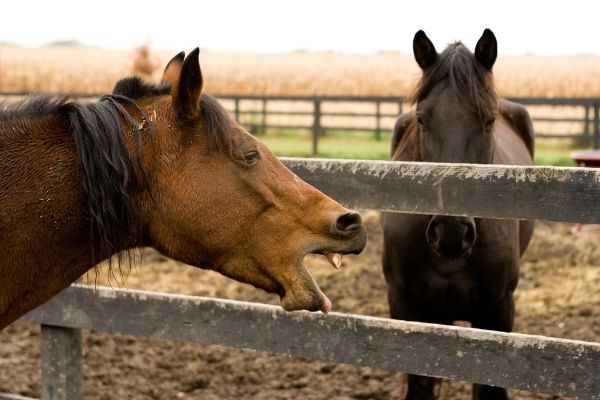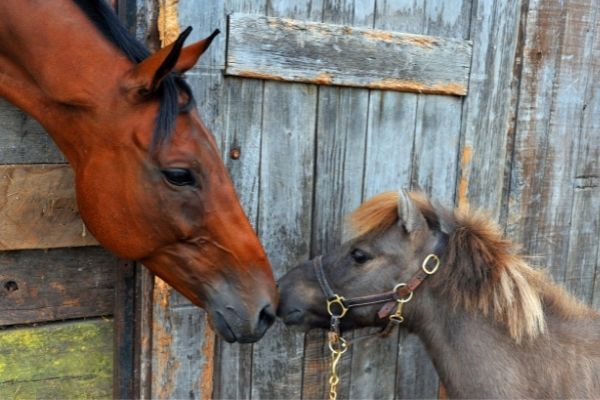The horse coughs: Who doesn’t know it, the horse suddenly coughs, has nasal discharge and its fitness level is poor. To avoid permanent problems, it is very important to act quickly. Here you learn how to prevent the causes in time and what the ideal treatment for coughing horses looks like.
The horse coughs – Typical symptoms
Common symptoms of a respiratory disease besides the horse coughing are lack of energy, swollen lymph nodes, nasal discharge up to nosebleeds and fever. Very obvious signs are also wheezing and breathing sounds with strained breathing up to shortness of breath. If you notice any of the following symptoms, you should urgently call the vet or take your horse to an equine clinic.
Cough
Whether occasional or frequent, during exercise or at rest, coughing is never normal and you should always have your horse examined by a veterinarian.
In addition to coughing, there are other signs that can tell you that your horse has a respiratory disease. Poor performance, swollen lymph nodes, nasal discharge, nose bleeds and fever can also indicate respiratory problems. Very clear signs, often late in the course of the infection, are breathing noises with strained breathing up to shortness of breath. This shows as a heave line in the case of prolonged illness.
Poor fitness
Loss of energy can be the first, subtle sign of respiratory disease. It is better to call the vet once too often. If a respiratory illness is overlooked, it can lead to a severe course of the disease. The earlier you act, the better the chances of recovery. After a careful diagnosis, the vet will decide on the treatment and medication.
Fever
The temperature is measured in the anus with a standard thermometer. The normal temperature in horses is between 37.3 – 38.4 °C. At a body temperature of approx. 39.5°C and above, one speaks of high fever. The normal temperature in foals is generally somewhat higher and lies between 38.0 – 39.0 °C.
Nasal discharge
Whether yellowish/yellowish-greenish, bloody or white-watery nasal discharge – an exact diagnosis by a veterinarian is absolutely necessary here!
Swollen lymph nodes
Swollen lymph nodes can also be signs of (dangerous) infectious diseases. Be sure to call your vet, for the protection of your horse and all other horses in the stable!
What to do when the horse coughs?
Depending on the type of the cough, anti-inflammatory, bronchodilator or mucus-clearing medicines and supplementary herbal mixtures can be used. The administration of anti-inflammatory drugs in particular through inhalation therapy has few side effects and is effective. But most importantly: Do not call your vet only in serious cases! Then it is usually already too late.
Treatment: What to do when the horse coughs?
Professional treatment by the vet
Coughing is always an alarm signal and must be examined by a veterinarian. When it comes to treatment, your veterinarian generally differentiates between acute horse coughs and chronic horse coughs (equine asthma).
Acute cough is almost always caused by viruses. Viruses trigger typical symptoms of bronchitis:
- Sudden fever
- Reduced appetite
- Fatigue, reduced participation in the environment
- Cough, shortness of breath
- Increased nasal discharge (mucus)
- Swollen lyph nodes
Often more than one animal in the barn is affected. To protect other horses in the stable, rapid response and treatment is important. Without treatment, coughing can become chronic and turn into equine asthma.
Horse coughs: Therapy
The goal is to normalise breathing and prevent chronic or incurable late complications.
- Loosening and clearing of thick mucus
- Decongestion of the bronchial tubes
- Anti-inflammation
- Stimulation and support of the immune system
Supportive measures: Herbs, plants & fruits
In addition to improving the horse’s environment and medicinal therapy, there is good evidence to support the treatment of equine cough with herbal substances. Depending on the form of the cough, expectorant and bronchodilator herbal mixtures can be used. Together, they can also strengthen the lungs under certain circumstances. Vitamin C, blueberry or rosehip support a healthy immune system. Ginger, schisandra berries, turmeric and rosemary also promote healthy lungs. But be careful: essential oils are not recommended for inhalation. They cause lasting damage to the lungs.
Many herbs are also valuable antioxidants and can help support the immune system. However, homeopathy, herbal medicine and other applications do not replace the administration of conventional medication and the important changes in the horse’s stabling.

Horse cough should not be taken lightly. It is better to call the vet once too often than too little before it gets worse.
Chronic cough – Equine asthma
More and more horses suffer from equine asthma. It refers to any chronic, non-infectious disease of the deep airways. This can cause serious damage to the lungs and result in a reduced quality of life and shorter life expectancy. It is therefore important to detect the disease as early as possible and thus prevent a worse course. A typical symptom is poor performance and occasional coughing. This clearly illustrates that whenever your horse coughs, you should take it seriously and contact the veterinarian.
How does asthma develop?
Two main factors are responsible for the development of chronic respiratory diseases in horses:
- Acute cough diseases that are not treated properly become chronic due to an allergy to dust containing fungal spores or due to a non-specific hypersensitivity.
- The constant exposure of a horse to the bad air of closed stables leads to the gradual development of a chronic respiratory disease.
What happens in the lungs?
The inflammation of the respiratory tract is the primary cause. In many cases the bronchial membrane is swollen, but the main problem is usually the hypersensitivity reaction of the bronchial muscles. A permanent bronchial spasm (bronchospasm) causes narrowing of the airways and makes breathing difficult. The horse can no longer breathe in enough oxygen into the pulmonary alveoli and as a result performance is affected.
How is asthma treated in horses?
Fighting the inflammation in the lungs is the primary goal of treatment. The key to long-term improvement is consistent optimisation of the horse’s environment. Anti inflammatory drugs, such as corticosteroids, are the primary basis of drug therapy. They are often used to combat inflammation and swelling in the airways of asthma patients.
The symptoms of bronchial spasm and increased mucus can be relieved by bronchodilators and expectorants.
What can I give when my horse coughs?
There are different treatment options. Inhalation therapy and adapted feeding support the treatment. Veterinary medication should not be dispensed with.

Big or small, any horse can cough. Every cough counts, so a veterinarian should always be consulted.
To prevent your horse from coughing, you should take the following measures:
Pay attention to the quality of the feed
Roughage should always be of impeccable quality. Especially fungal spores in the hay, but also bacteria and mites can trigger allergic reactions and can be a great danger for the horse’s lungs. Many horse owners therefore steam their hay in order to destroy any allergens. Hay steaming is a particularly effective solution to minimise dust in the stable. Soaking the hay in fresh water for 10 minutes is also an effective and recommended method.
Avoid stirring up dust
If you want to prevent coughing, you should definitely take the horses out of the stable when mucking out, because at this time the proportion of spores in the air increases fivefold. Stirring up dust, e.g. by shaking up hay and straw, should be avoided. Therefore, you should also moisten the stable aisle with water before sweeping. The smallest dust particles are particularly dangerous, as they can penetrate deep into the lungs. In addition, hay and straw should not be stored above the horses.
Horse owners also often underestimate the dust exposure in indoor or outdoor arenas. Stuffy indoor arena air is poison for the respiratory tract and leads to coughing. The fine particles of sand, wood or textile fibres not only irritate the upper respiratory tract, but can also be transported into the sensitive alveoli due to deep breathing during work.
Provide fresh air
Fresh air is not only good for the lungs per se. Thermal stimuli are important for the horse’s immune system, they stimulate blood circulation and metabolism. Good ventilation helps to remove dust. But not only dust, but also humidity is sent out through the window. This is important because a warm and humid stable climate is problematic and creates optimal conditions for germs to grow.
Exercise is important
Exercise is important to keep the lungs well ventilated and healthy. At least one hour of walking, trotting and cantering daily. Even more important is sufficient exercise when weather conditions restrict paddock access.
Allow to dry after exercise
After riding, the horse should not return to the box sweaty, which means riding dry for a sufficiently long time, putting on a sweat rug or using the solarium. It is also important to avoid draughts.
Vaccination
Pathogens such as viruses and bacteria also attack the horse’s lungs and are often the cause of coughs. Comprehensive vaccination protection should therefore be an absolute must. In larger stables and where there is a frequent change of horses, the risk of infection increases. This also applies to travel or at shows. Pathogens are introduced into the stable by an infected or sick horse and then move from animal to animal through the entire herd.
These causes, whether occurring individually or in combination, weaken the respiratory and immune systems and viruses and bacteria can easily attack.
When can I ride again?
It depends on the cough. If the horse has a fever, it should only be moved at a walk and not sweat. In other cases, exercise, especially galloping, does a lot of good.
Cough in the horse – still riding?
If it is an acute cough with fever, the horse should only move at a walk in the fresh air. Because indoor dust is also harmful. In case of a chronic cough (blood count ok and no fever) cantering is a good therapy for the horse.
First of all, the warm-up phase should be observed. The horse takes one breath per canter jump so that the lungs are evenly loaded. One should always keep in mind that a very low load (only walking movement or short trotting) can reduce the volume in the lungs and can also damage the lung tissue. Therefore, healthy load on the lungs is so important.
